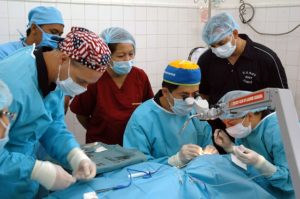 Individuals who struggle with addictive type behaviors have an increased risk for developing co-occurring disorders. The Substance Abuse and Mental Health Services Administration (SAMHSA) has used the term “co-occurring disorders” to refer to individuals who have a co-existing mental health and substance use disorder [1].
Individuals who struggle with addictive type behaviors have an increased risk for developing co-occurring disorders. The Substance Abuse and Mental Health Services Administration (SAMHSA) has used the term “co-occurring disorders” to refer to individuals who have a co-existing mental health and substance use disorder [1].
For example, this may include major depression co-occurring with alcoholism, or post-traumatic stress disorder diagnosed with prescription drug abuse.
Similar Characteristics Between Addictive Behaviors
Because the characteristics of addictive behavior are similar by nature, it is common for co-occurring disorders to develop, or for individuals to incur another addiction in place of something else.
In some instances, a person who has previously struggled with a drug or alcohol addiction might develop compulsive behaviors with something else once becoming sober, such as gambling or an eating disorder.
The Connection to Weight Loss Surgery
An area in which a transfer of addictions is commonly observed is the field of weight loss surgery, such as bariatric surgeries, including:
- Gastric banding
- Gastric bypass
- Sleeve gastrectomy
- Biliopancreatic diversion
 Binge eating disorder is a mental health disorder that is characterized by compulsive overeating. A common complication that results from binge eating disorder is weight gain and obesity. Many individuals who suffer from binge eating disorder will look to bariatric surgery as a way of managing weight.
Binge eating disorder is a mental health disorder that is characterized by compulsive overeating. A common complication that results from binge eating disorder is weight gain and obesity. Many individuals who suffer from binge eating disorder will look to bariatric surgery as a way of managing weight.
Research has shown that over 50 percent of individuals who seek bariatric surgery for weight loss purposes have binge eating disorder [2].
Weight Loss Doesn’t Solve the Problem
Unfortunately, weight loss itself will not resolve compulsive behaviors that are associated with binge eating disorder. Many individuals who seek out bariatric surgery for weight loss may continue to engage in other compulsive behaviors if underlying issues are not adequately and completely addressed.
Bariatric surgery can help an individual achieve weight loss, but it cannot cure the mental health disorder that triggered weight gain in the first place.
A transfer of addiction is commonly observed in individuals with addiction behavioral traits after weight loss surgery [3]. One unhealthy behavior can easily be traded for another if the root of the issue is not professionally addressed, such as:
- Compulsive shopping
- Alcoholism
- Sexual addiction
Sexual promiscuity may arise as a source of emotional comfort and distraction.
Misconceptions About Weight Loss
 A typical misconception among overweight or obese individuals who struggle with poor body image is that these concerns will be alleviated once weight loss is achieved. For a man or woman suffering from binge eating disorders, body image concerns and poor self-esteem will likely persist, even after weight loss through surgery.
A typical misconception among overweight or obese individuals who struggle with poor body image is that these concerns will be alleviated once weight loss is achieved. For a man or woman suffering from binge eating disorders, body image concerns and poor self-esteem will likely persist, even after weight loss through surgery.
These individuals may then develop sexual promiscuous behaviors to temporarily quench a need for acceptance or to deal with body image insecurities.
Signs and Symptoms of Sexual Addiction
While sexual addiction is not officially classified as a mental health disorder, it is a real condition that many individuals suffer with. If you are concerned that you or a loved one may have developed compulsive sexual behaviors following bariatric surgery, be aware of these following signs and symptoms:
- Preoccupation with sexual activities that interferes with normal day living
- Compulsive masturbation
- Use of pornography, telephonecybersexx, or prostitutes
- Promiscuity in sexual relationships, such as multiple partners, affairs, cheating, and one-night stands
- Abnormal and intense sex drive
- Inability to stop or control sexual behaviors
Individuals suffering with hypersexuality or sexual addiction are unable to stop their behaviors, even as detrimental consequences unfold, such as sexual transmitted diseases, broken relationships, loss of a job, or financial ruin.
The True Nature of Addictive Behaviors
The important thing to be aware of is the nature of addictive behaviors, whether it be binge eating disorder or sexual addiction. Because of the many similarities that mental health disorders can share, addictions can be co-occurring or can develop into other addictions.
For these reasons, it is crucial that professional help is sought to address and treat any underlying concerns that may be influencing addictive and compulsive behaviors. If you have been suffering with sexual addiction following weight loss surgery, know that there is support and help for your recovery.
Many treatment programs offer recovery plans for co-occurring disorders to simultaneously treat more than one mental health disorder. Utilizing such a program may be one of the most effective tools for recovery and healing.
 About the Author:
About the Author:
Crystal Karges, MS, RDN, IBCLC, is a Masters-level Registered Dietitian Nutritionist (RDN) with a specialty focus in eating disorders, maternal/child health and wellness, and intuitive eating. Combining clinical experience with a love of social media and writing, Crystal serves as the Director of Content and Social Media for Eating Disorder Hope/Addiction Hope, where her passion to help others find recovery and healing is integrated into each part of her work.
As a Certified Intuitive Eating Counselor, Crystal has dedicated her career to helping others establish a healthy relationship with food and body through her work with EDH/AH and nutrition private practice.
References:
- Substance Abuse and Mental Health Services Administration (SAMHSA), “Co-Occurring Disorders”, Retrieved 21 Oct 2014, http://www.dpt.samhsa.gov/comor/co-occuring.aspx
- Westerburg DP, Waitz M (November–December 2013). “Binge-eating disorder”. Osteopathic Family Physician 5 (6): 230–33. doi:10.1016/j.osfp.2013.06.003.
- Bariatric Times, “Transfer of Addiction and Considerations for Preventive Measures in Bariatric Surgery: Part II”, Retrieved 21 Oct 2014, http://bariatrictimes.com/transfer-of-addiction-and-considerations-for-preventive-measures-in-bariatric-surgery-part-ii/
The opinions and views of our guest contributors are shared to provide a broad perspective of addictions. These are not necessarily the views of Addiction Hope, but an effort to offer discussion of various issues by different concerned individuals.
We at Addiction Hope understand that addictions result from a combination of environmental and genetic factors. If you or a loved one are suffering from an addiction, please know that there is hope for you, and seek immediate professional help.
Last Updated & Reviewed By: Jacquelyn Ekern, MS, LPC on October 20, 2016
Published on AddictionHope.com
